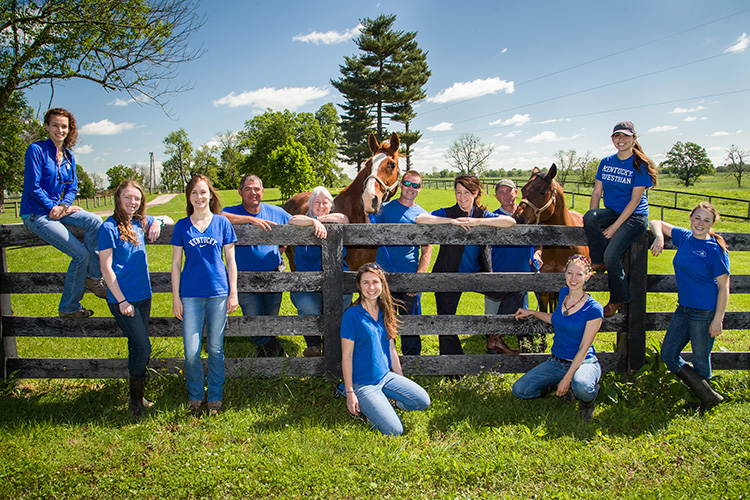One year in, MARS Equestrian™ Fellow at UK’s Gluck Equine Research Center continues to help older horses
One year in, MARS Equestrian™ Fellow at UK’s Gluck Equine Research Center continues to help older horses

Horses aged 15 and over make up between 20% to 30% of the U.S. equine population. An important milestone will be reached this year in the quest to learn more about this population. October marks the one-year anniversary of Amanda Adams, associate professor at the University of Kentucky Gluck Equine Research Center specializing in aged horse research, becoming the first MARS Equestrian™ Fellow. This fellowship supports her work to improve not only how the industry cares for senior horses but also how veterinarians can better diagnose the conditions and diseases that affect them.
According to Linda Mars, gaining a better understanding of how nutritional and management requirements change with age and activity will help the industry provide the best possible care to horses and ponies throughout their lives.
As horses age, they face an increased risk for some common conditions and diseases. One of those, pituitary pars intermedia dysfunction, develops in approximately 20% of senior horses. Another condition, equine metabolic syndrome, is associated with insulin dysregulation and often obesity. This can occur in all aged animals but may have additional adverse consequences in the older horse. Both are associated with the development of laminitis, a very painful and debilitating condition of the hoof that is often life ending.
These are just two of the key problems that Adams’ team has been able to work on with MARS Equestrian support. Her team has established and maintains a unique herd of nearly 80 aged, obese and metabolic syndrome horses. The herd is the only one of its kind in the U.S., and it provides unique opportunities to study geriatric and endocrine diseases in horses.
According to Adams, most of what her team knows and what they are learning about aging and endocrine diseases in this population of special needs horses wouldn’t be possible without access to this research herd.
“In a short period of time, we have made major breakthroughs in gaining a better understanding of how to nutritionally manage horses suffering from insulin dysregulation, specifically in equine metabolic syndrome horses. We are also learning that the season has a profound influence on the metabolic responses of these diseased horses, which will help shed light on why these horses may develop laminitis at certain times of the year,” said Adams, a faculty member of the UK College of Agriculture, Food and Environment. “Over the last year, we have also been working to define sarcopenia (an age-related loss of skeletal muscle mass and strength) in aged horses and how specific diet and exercise routines may reverse or improve that muscle loss. Furthermore, we are studying what effect exercise has on the inflammation-aging response in aged horses.”
While the progress is promising, Adams said that more work is needed. In addition to learning how to better manage these horses, there is a need at the basic scientific level to understand how the aging process affects the horse’s immunity, metabolic status and nutritional needs.
“The many problems we face with the aging horse are important given the growing senior horse population,” said Pat Harris, Director of Science, MARS Horsecare. “Thus, it is critical that we continue these efforts to advance the field and improve our knowledge in senior horse care ” “ultimately creating a better world for horses” added Bridgett McIntosh, Director of MARS Equestrian™.
About the Gluck Center
The mission of the Gluck Center is scientific discovery, education and dissemination of knowledge for the benefit of the health and well-being of horses. Gluck Center faculty conduct equine research in seven targeted areas: genetics and genomics, immunology, infectious diseases, musculoskeletal science, parasitology, pharmacology, therapeutics and toxicology and reproductive health. The Gluck Equine Research Center, a UK Ag Equine Program, is part of the Department of Veterinary Science in the College of Agriculture, Food and Environment at the University of Kentucky.
About MARS Equestrian™
MARS Equestrian™ Sponsorship by Mars, Incorporated is the link between our iconic brands and the equestrian community. For generations, Mars has celebrated a rich equestrian heritage, and through purposeful partnerships, MARS Equestrian™ is committed to the sport and building an enduring legacy. From world-class competitions across all equestrian disciplines, to stewarding the power of horses on society and sustainability, MARS Equestrian™ is dedicated to our purpose to improve the lives of horses, pets, and the people who love them. For more information please visit our website at www.marsequestrian.com and social media @marsequestrian.
About WALTHAM Petcare Science Institute
The WALTHAM Petcare Science Institute is Mars Petcare's pet research center. Our work focuses on the nutritional and behavioral needs of pets, as well as preventive health. We use this knowledge to support development of innovative products and services, advancing science to deliver our Purpose: A BETTER WORLD FOR PETS™. The WALTHAM™ Equine Studies Group, which is headed by Professor Pat Harris, MA, PhD, VetMB, DipECVCN, MRCVS, is dedicated to advancing the science of horse nutrition and provides the scientific support for MARS Horsecare globally including the BUCKEYE™ Nutrition, SPILLERS™, and WINERGY™ brands. By collaborating with key research institutes and universities around the world its work remains at the forefront of equine nutritional science.
Ag Equine Programs Extension Research


